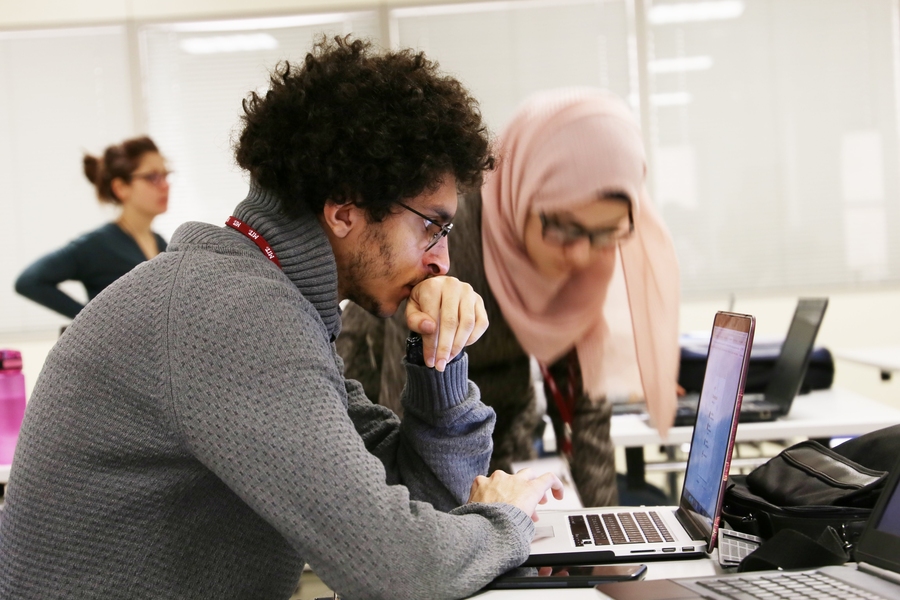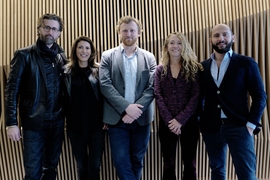The lives of refugees aren’t just disrupted by the loss of a homeland, but also by massive challenges in accessing educational and professional opportunities. A collaboration between the MITx MicroMasters program in data, economics, and development policy (DEDP), the Abdul Latif Jameel Poverty Action Lab (J-PAL), and the MIT Refugee Action Hub (ReACT) seeks to address these challenges. MIT’s Department of Economics and J-PAL co-developed and launched the MITx MicroMasters Program in DEDP in 2017. The new collaboration will allow refugee learners to receive scholarships for DEDP courses, participate in skills-building workshops, and connect with top organizations and companies in the field of development economics and data analysis.
As Esther Duflo, the Abdul Latif Jameel Professor of Poverty Alleviation and Development Economics at MIT, and the co-director and co-founder of J-PAL observes, “From the beginning, our objective for the MicroMasters and blended master’s in DEDP was to create an offering that gives people the skills and tools to solve some of the world's most difficult challenges — whoever they are, and wherever they are. The collaboration with ReACT means we will move one step closer to this goal.”
Admir Masic, the Esther and Harold E. Edgerton Career Development Professor in the Department of Civil and Environmental Engineering, founded ReACT in 2017 to provide blended learning opportunities in computer and data science and entrepreneurship to refugees around the world. “I’m so excited about the new track within the DEDP/ReACT MicroMasters certificate program,” says Masic, “because on top of all the other benefits associated with the ReACT blended learning approaches, we open the way for our refugee students to gain a master’s degree from MIT or any other university in this MicroMasters network.”
Blending good intentions with data-driven approaches
The DEDP/ReACT collaboration offers refugees a bespoke combination of attaining scholarships for online learning, gaining connections to paid internships, and coming together as a community at in-person immersive workshops. A group of ReACT-supported refugees will take MicroMasters courses online starting in the summer semester of 2018 with the DEDP online courses, “The Challenges of Global Poverty” and “Data Analysis for Social Scientists.” Refugees will come together in Amman, Jordan in January 2019 for a series of workshops taught by MIT faculty, staff, and students on entrepreneurship, innovation, and leadership. The goal is for these learners to begin their online DEDP coursework this June and complete the five courses in the DEDP program by the end of the spring semester next year.
Robert Fadel, the executive director of ReACT, notes, "The new ReACT initiative with the MicroMasters program in DEDP offers refugees a way to gain access to educational and professional opportunities, and helps empower them with the tools to resolve some of the most pressing problems within their own communities."
Refugees taking the DEDP courses will study the root causes of poverty, while also developing skills in economics and data analysis that will enable them to build data-driven approaches to help drive positive change.
As Anna Schrimpf, associate director of education at J-PAL and DEDP program director explains, “People have strong intuitions about what they think might work to drive change, but we also have a responsibility to inquire whether what we’re doing is impactful — whether we’re spending scarce resources in a way that is actually improving the lives of the poor. Good intentions aren’t enough. You also need to develop data-driven approaches to deliver results and sustainable change.”
Empowering refugees to change lives (including their own)
The new program is personal for Masic, who overcame challenges as a refugee himself. He founded ReACT based on his own experiences in accessing higher education and leveraging its power. When Masic was a child, his family fled from war-ravaged Bosnia and Herzegovina to a refugee camp in Croatia. Thanks to receiving opportunities to pursue a higher education, Masic lived and conducted research in Germany and Italy before coming to MIT. “I am realizing a dream that I had when I first came to MIT. I get very emotional about this new DEDP/ReACT initiative, because we’re building something that could impact so many lives around the world, and will give refugees a very unique, extremely powerful opportunity. With this new collaboration, we’re providing concrete pathways for those who believe in education as a key for a better life.”
Masic offers another story to illustrate how refugees can be profoundly impacted by educational opportunity. While eating breakfast with the first cohort of ReACT students in Amman, Jordan a few months ago, Masic noted, “A refugee student whom I didn’t know came to the table, ate quickly, and went away without saying a word to anyone,” said Masic.” The student seemed so embarrassed and so full of insecurity, which connected with my own refugee experience.” After the breakfast, said Masic, “I saw him sitting outside by himself. Well, fast forward just ten days later and the two of us were huddled together and talking about starting a new company. This refugee had become so enthusiastic about everything that was happening around him that he turned from a psychologically-closed person into this incredibly creative and open individual who was excitedly exploring new opportunities.”
J-PAL’s Anna Schrimpf agrees that the goal of this initiative is to empower refugees to mitigate some of the most pressing social problems facing them as individuals and as a community. With over 65 million refugees worldwide and counting, “The mission of the initiative is to bring refugees together to create a global community around online learning,” says Schrimpf. “We have the means to empower refugees to be socially responsible leaders in their own communities — to be the future leaders who show the way.”
Building pathways to opportunity
Blended learning offers important educational and professional pathways for refugees who’ve had their lives and support structures disrupted by displacement. The new MicroMasters DEDP/ReACT initiative provides a foundation and a technical expertise upon which refugees can to rebuild their lives and communities worldwide.
MIT Dean for Digital Learning Krishna Rajagopal notes, “With this joint initiative, we are providing a new pathway to opportunity to people whose educational and career paths have been utterly disrupted. Refugees themselves are deeply aware of the challenges they and their communities face, and we are proud to be working alongside ReACT to offer refugees the tools to improve their lives and address these challenges together.”
For those interested in learning more about this program or sharing this program with refugee learners that they might know, please visit the ReACT website for a more in-depth description of the program.








